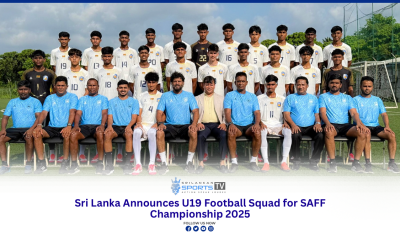News
Do we think about tail-enders batting ability?
In the game of Cricket, tail-enders are the ones who are at the bottom of a score sheet or the players who have a lower level of batting ability. Normally, in a match, if a side loses 6 or 7 wickets, their tail-enders start coming to bat and that batting team’s innings probably finish in a short time period. But there are some tailenders who show great resistance to the bowling team and frustrate the bowling team when these tailenders come to bat.
But most of the time these tailenders come and just throw the bat at deliveries and give away their wicket irresponsibly. Sometimes tail-enders or these proper bowlers don’t think about their batting because they think their duty is just bowling or sometimes teams and their management don’t pay attention to the batting of their tailenders or sometimes teams and their management think and talk about uplifting the batting ability of their tail-enders but not implement them in the practice sessions.
For example, history and records tell that Bangladesh, Sri Lanka and West Indies produce tail-enders with the worst batting ability while England, Australia, and New Zealand produce tail-enders with enough ability in batting. Also, the Indians produce tail-enders who have the ability in batting from the last few years.
If a side has strong tail-enders, that team can put extra 30-40 runs or more to their tally and that team will increase the confidence of their team and their batting department.
For solving this problem, basically, teams and coaches must put these tail-enders on nets and to side wickets and must practice them regularly or individually these tail-enders have to focus on their batting as well as their bowling. And that can increase the batting ability of tail-enders and can cause the success of a team. But this would not be a long-term solution or the most effective solution because it’s not easy to learn a skill when players come to the elite level and not easy to put a skill into muscle memory when players become adults.
Because of that, the best stage to uplift the batting ability of tail-enders is School Cricket. Most of the time in school cricket, the bowlers of a team don’t get a chance to bat in practice sessions and they just bat two, or three times a month in the middle and ask to do well in match situations when they don’t have enough batting practice and confidence. Because these school tail-enders carry this cycle for a longer period of time, they become typical tail-enders who don’t have the ability to bat, and who just have to hang around in the crease when coming to bat after they become elite international players. Bangladesh, Sri Lanka and West Indies face the consequences of this. For that school coaches must get the responsibility to train tail-enders in batting and coaches must influence their tail-enders to do training in batting individually. Also, school coaches can give batting tasks in practices as well as in matches for their tail-enders, and coaches must give confidence and uplift the confidence of their school team tail-enders.
By Chathushka Kalunayaka
Cricket
Jamie Siddons Appointed Head Coach of Sri Lanka Women’s Team
Sri Lanka Cricket has appointed former Australian cricketer Jamie Siddons as the Head Coach of the Sri Lanka National Women’s Team.

Siddons has served as the head coach of the Bangladesh National Men’s Team from 2007 to
2011, marking his highest level of international coaching experience.
A Level 3 qualified coach, Siddons has also served as Head Coach of the South Australia
Cricket Team (Redbacks) from 2015 to 2020 and Head Coach of the Wellington Firebirds,
New Zealand, from 2011 to 2015.
His one-year appointment will come into effect on 16 March 2026. Siddons, who enjoyed an extensive first-class cricket career in Australia and captained both South Australia and Victoria, will take on the responsibility of guiding Sri Lanka’s women’s team in preparation for the ICC Women’s T20 World Cup 2026, scheduled to be held in June in England.
His first assignment will be Sri Lanka Women’s Tour of Bangladesh, scheduled to take place in April–May 2026.
Cricket
Government Weighs Overhaul of Sri Lanka Cricket Amid ICC Talks
Sri Lanka’s Sports Minister Sunil Kumara Gamage has revealed that discussions are currently underway with the International Cricket Council (ICC) regarding possible reforms to the administration of Sri Lanka Cricket (SLC). A final decision is expected within the coming week, as the government seeks to avoid the risk of sanctions from the ICC.
Speaking on the matter, Minister Gamage confirmed that options such as appointing an interim committee or a competent authority are being considered. He noted that President Anura Kumara Dissanayaka is directly involved in the talks, underscoring the government’s determination to restore credibility and raise cricketing standards in the country.
The announcement follows comments made by Minister Nalinda Jayathissa, who stated that the government will soon take decisive action on the legal and administrative framework of SLC.
Sri Lanka Cricket has faced mounting criticism after the men’s national team failed to qualify for the semi‑finals of the recently concluded T20 World Cup, co‑hosted by Sri Lanka and India. The disappointment adds to a troubling record: the team has now gone 12 years without reaching the semi‑finals of any ICC tournament, a stark contrast to its former reputation as a consistent global contender.
Cricket
South Africa misses yet another ICC trophy as NZ knocked South Africa out in Semis
South Africa’s long wait for an ICC trophy continued as they suffered another heartbreaking exit, this time at the hands of New Zealand in the first semi-final of the ICC T20 World Cup 2026 at Mumbai on Wednesday. The Proteas, who had finished runners-up in the last edition, were outplayed by nine wickets in a contest that highlighted both their misfortune and New Zealand’s ruthless efficiency.
Batting first, South Africa managed 169 for 8 in their 20 overs. Captain Aiden Markram and Quinton de Kock fell cheaply, leaving the middle order under pressure. Dewald Brevis showed promise with a fluent 34, while Tristan Stubbs added 29. The standout was Marco Jansen, who smashed an unbeaten 55 off just 30 balls, lifting the total to a competitive score. Yet, frequent wickets at crucial stages meant South Africa never truly seized momentum.

New Zealand’s reply was nothing short of brutal. Finn Allen launched a stunning assault, hammering 100 off just 33 balls, including 10 fours and 8 sixes. Tim Seifert’s 58 ensured the chase was never in doubt, and the Black Caps cruised home in just 12.5 overs. South Africa’s bowlers, including Jansen and Bosch, were taken apart, with economy rates soaring above 11.
-

 Football1 year ago
Football1 year agoSri Lanka Schools National Championship 2025: Super 8 Fixtures and Grouping
-

 News1 year ago
News1 year ago2025 Schools Rugby Season Set to Thrill Fans with Knockout and League Action
-

 Cricket9 months ago
Cricket9 months agoNuwan Thushara Shines as RCB Storms into IPL 2025 Final
-

 Live4 years ago
Live4 years agoLive Broadcast of Syria vs Sri Lanka | AFC U23 Asian Championship Qualification
-

 Cricket1 year ago
Cricket1 year agoSri Lanka’s Greatest Cricketers: Top Batters and Bowlers of All Time
-

 News9 months ago
News9 months agoMajor Shake-Up in Sports Governance: New 2025 Regulations Reform National Sports Bodies in Sri Lanka
-

 Football1 year ago
Football1 year agoFFSL Rebrands Division-1 as ‘League-One’ with a Bold New Vision
-

 Football10 months ago
Football10 months agoSri Lanka Announces U19 Football Squad for SAFF Championship 2025







